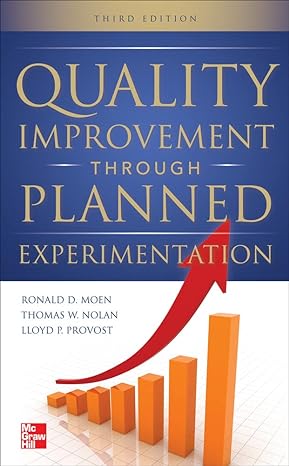The accounts payable quality improvement team was studying the process of paying invoices. They wanted to improve
Question:
The accounts payable quality improvement team was studying the process of paying invoices. They wanted to improve the efficiency and accuracy of payments. During the development of flowcharts, the team found that there was variability in the process among the three clerks and at different time periods. In their attempts to standardize the process, four alternative procedures were developed.
The team decided to study the four alternatives and choose the process with the highest efficiency (number of invoices paid) and best accuracy (lowest number of errors) as the standard.
The team was concerned that the evaluation could be affected by variation in the payment process from week to week. This variation included number of invoices received, end-of-month payments, and other peculiarities related to different time periods.
A balanced incomplete block design was chosen for the test. A block was defined by the week in which the test was done. There were four levels of the factor, “process alternative,” to study. Each of the clerks could use a different alternative during a time period.
The design with four factor levels, a block size of three, and four blocks was selected (see Table 3.9). The three process alternatives within a week were randomly assigned to one of the clerks. The experimental pattern was replicated by running the study for eight weeks. The following data were obtained.
(a) Analyze each of the response variables for this study.
Prepare run charts, calculate adjusted values, and construct run charts of the differences. Label the factor level (the process alternative) on the run charts. Group the adjusted values by factor level for evaluation of each process alternative.
(b) Which alternative process can be expected to have the highest efficiency? Which alternative will give the least number of errors? What kind of study should the team complete next?
Step by Step Answer:

Quality Improvement Through Planned Experimentation 3/E
ISBN: 978-0071759663
3rd Edition
Authors: Ronald Moen ,Thomas W Nolan ,Lloyd P Provost





